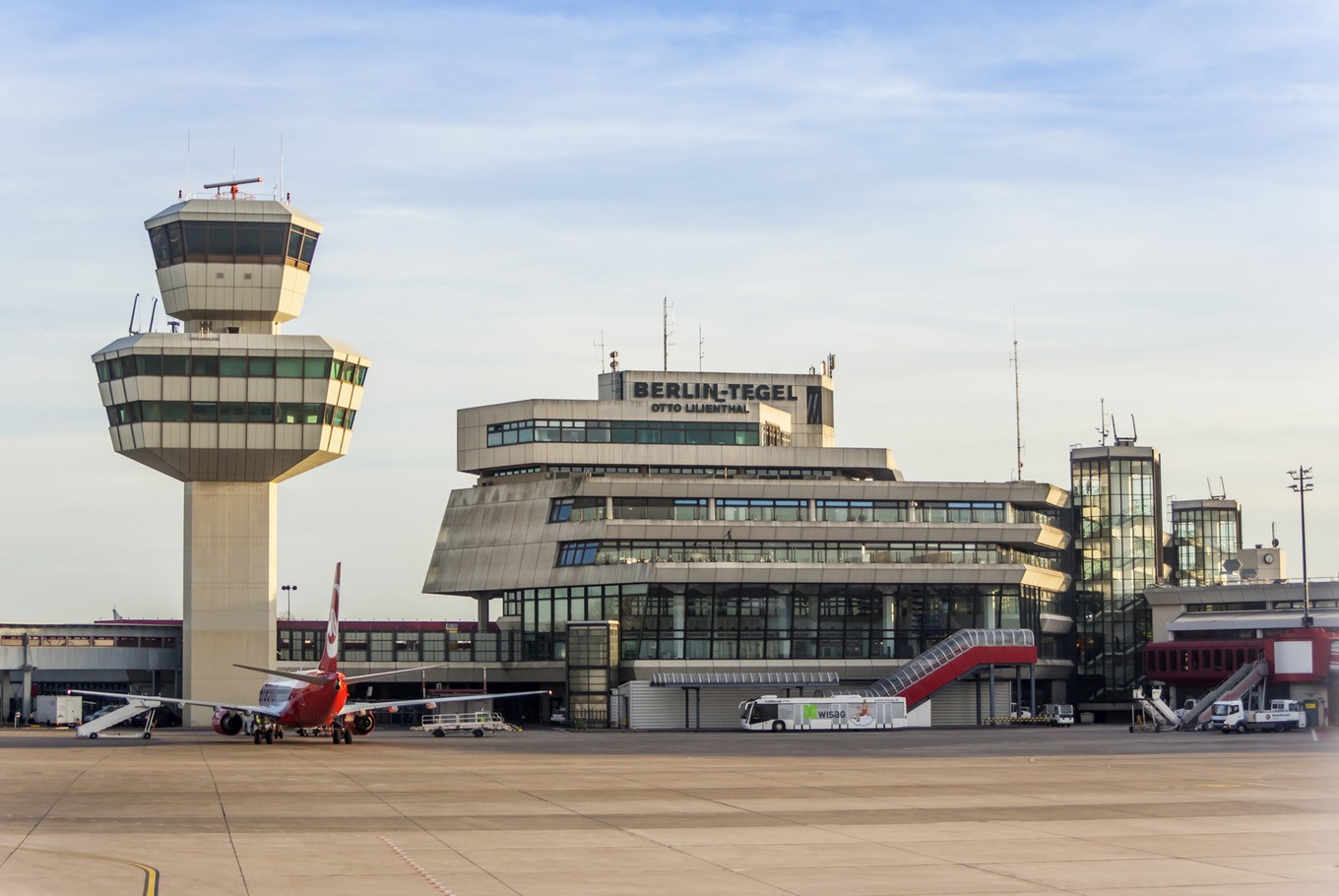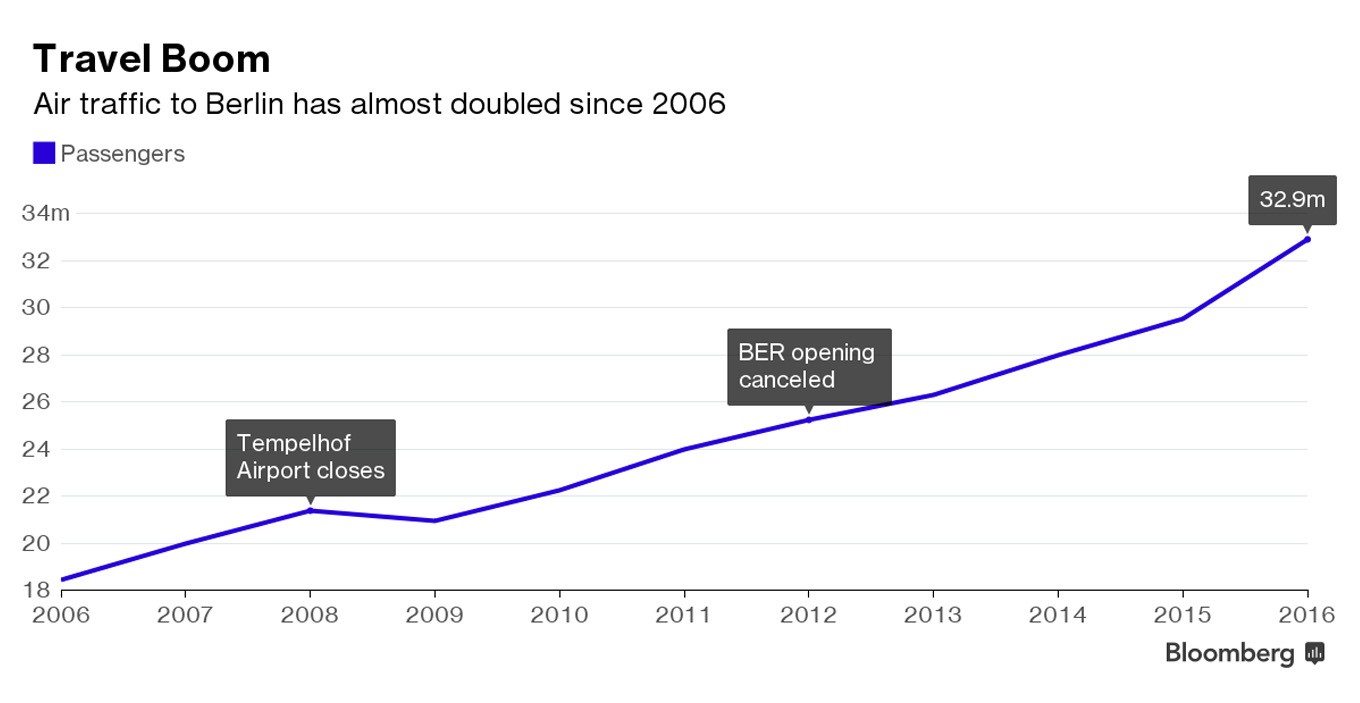Berlin’s airport debacle: Five years late and counting
Delays at the new airport have doubled the cost, to $5 billion, and damaged the finances of airlines and local businesses.
Change Size
 A view of Berlin Tegel Airport on Mar. 23, 2011. (Shutterstock/bellena)
A view of Berlin Tegel Airport on Mar. 23, 2011. (Shutterstock/bellena)
Y
ou think you have a travel story from hell? Try this one: The inaugural flight from Berlin’s new international airport is almost five years late, and no one can say when it might take off.
The airport’s planned launch in June 2012 was scrapped a month before its unveiling because of fire safety issues, and it’s since been pushed back three times. With costs piling up at €13 million ($14 million) a month, the operating company in March saw the departure of its third chief in four years. The black eye for Germany’s exalted engineering prowess threatens to undermine a tourism boom in Berlin, and there’s talk of scrapping a plan to shutter Tegel, one of the city’s existing airports. “This airport should have been a world-class showpiece for Germany,” says Tim Clark, president of Emirates Airline, which has long sought to introduce service to Berlin. “It’s an embarrassment.”
(Read also: Portugal airport to be named after Ronaldo near his hometown)
The bill for Berlin Brandenburg Airport Willy Brandt—most people call it BER—has more than doubled, to some €5 billion, since construction began in 2006. And the delayed opening has wounded local restaurants as well as airlines Air Berlin Plc and Deutsche Lufthansa AG, which had expected to expand routes from the capital. Instead, Germany’s biggest city has fewer overseas flights than Düsseldorf (with less than a quarter of Berlin’s population).
The list of construction defects reads like a bad joke: Automatic doors lacked electricity, escalators were too short, and a smoke-extraction system was so complex, yet ineffective, it was dubbed “the Monster,” according to daily tabloid Bild. To keep the air flowing and limit mold growth, empty trains run to an empty station in the basement of BER’s glass-clad terminal. Upstairs there’s everything an airport needs—except passengers.
Once BER opens, it may already be too small. It was designed to accommodate 27 million passengers annually—ample for the 18 million arrivals in Berlin in 2006. But last year, Tegel and the city’s other functioning airport, Schönefeld, handled 33 million passengers. And BER will have 118 check-in counters, about 80 fewer than the combined number at Tegel and Schönefeld. “Resolving the capacity problem of BER will take another several years,” says Simon Morris, vice president at aviation adviser ICF International.
(Read also: Dubai boasts world’s fastest, free airport Wi-Fi)

The airport operator, Flughafen Berlin Brandenburg GmbH, which also runs Tegel and Schönefeld, says the terminal is 89 percent completed and some 150,000 defects have been remedied. The fire safety system is now largely fixed, 6,000 kilometers (3,728 miles) of cables have been relaid, and the northern runway has been resurfaced. With planned expansions, the airport will have enough capacity, the state-owned company said in an email. The aim is to “finish BER as soon as possible.”
When the 2012 delay was announced, restaurants had already installed ovens and dishwashers in the terminal, Berlin designer Evelin Brandt had hired four people for a boutique and stocked it with clothing, and a toy retailer had ordered stuffed animals for its shelves. Haru-Reisen GmbH bought three buses to ferry travelers to BER, then had to sell them at a loss. All told, the company has swallowed some €300,000 in unreimbursed costs, says Karsten Schulze, Haru’s managing director. “No one wants to accept responsibility for the damage small companies have endured,” he says. The airport operator says it compensated some vendors with retail space at Tegel and Schönefeld.
(Read also: Take virtual flight from Ikebukuro)
Air Berlin, which had expected BER to become its main hub, says it has “great concern” over the turmoil. The delay contributed to financial woes at Air Berlin, which in 2014 settled a suit with the airport operator after claiming at least €48 million in damages. Rival Lufthansa hired 200 cabin crew in 2012 for expected new routes and built a maintenance hall the size of a football field. The crews have mostly been transferred to the carrier’s low-cost arm, and part of the repair facility is being rented for servicing private jets. The situation at BER “is pretty embarrassing,” says Carsten Spohr, Lufthansa’s chief executive officer. “As a German engineer, I’m rather annoyed.”
The government in 2008 closed Tempelhof—the historic facility where Allied planes landed in the Berlin Airlift—and the plan is to do the same with Tegel once BER begins operating. Designed for a fraction of the 21 million people who pass through annually, Tegel feels like it’s held together with duct tape: A secondary terminal is tacked onto a converted parking garage, and Air Berlin occupies a massive metal shed without any jet bridges. Still, the facility ranks highly with locals, and in its original hexagon-shaped terminal—opened in 1974—the distance from taxi to plane is just a few dozen steps. A citizens’ group has collected 250,000 signatures backing a referendum calling to keep Tegel open.
Dieter Faulenbach da Costa, a consultant who’s worked on airports in Frankfurt, Moscow, and New York, says not to expect a resolution anytime soon. He says it’s unlikely BER will open in less than four years—and that it might even be mothballed. “The airport company still doesn’t have the situation under control,” he says. “I don’t see them finding a way out of this crisis.”
—With Richard Weiss and Andrea Rothman
The bottom line: Delays at Berlin’s new airport have doubled the cost, to $5 billion, and damaged the finances of airlines and local businesses.






